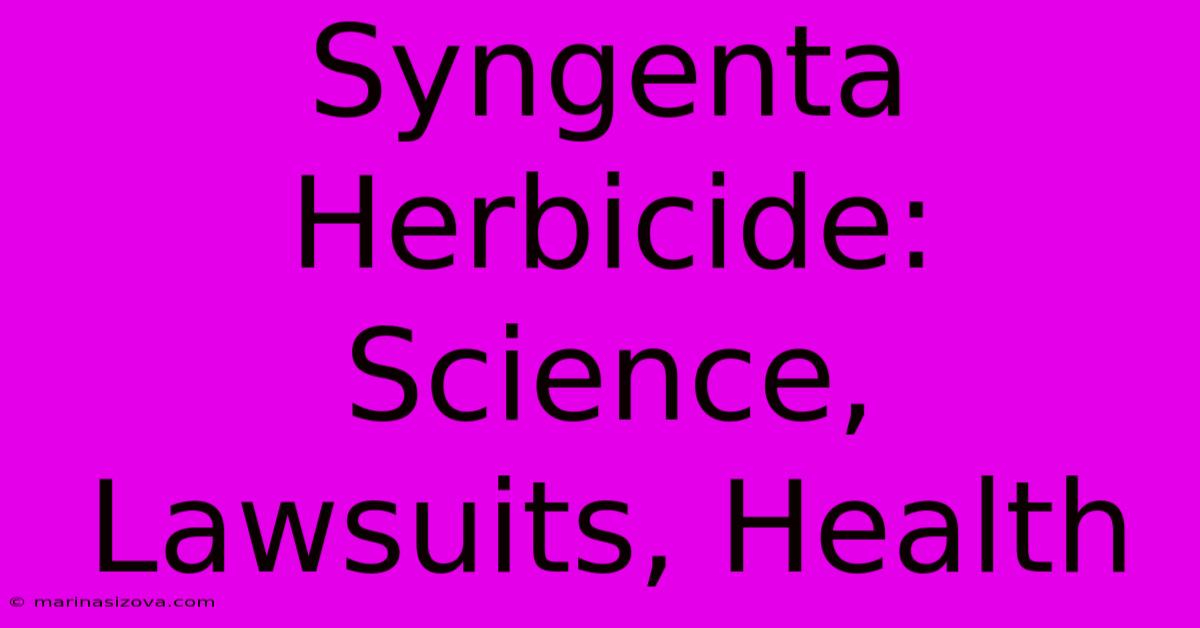Syngenta Herbicide: Science, Lawsuits, Health

Discover more detailed and exciting information on our website. Click the link below to start your adventure: Visit Best Website. Don't miss out!
Table of Contents
Syngenta Herbicide: Science, Lawsuits, and Health Concerns
Syngenta, a multinational agricultural company, is a major player in the herbicide market. Its products, including the widely known Roundup, have been both celebrated and scrutinized for their impact on agriculture, the environment, and human health. This article delves into the science behind Syngenta herbicides, the legal battles surrounding their use, and the emerging health concerns associated with them.
The Science Behind Syngenta Herbicides
Syngenta's flagship product, Roundup, contains glyphosate, a broad-spectrum herbicide known for its effectiveness in controlling weeds. Glyphosate works by disrupting the shikimate pathway, a metabolic process essential for plant growth.
Key Facts about Glyphosate:
- Effectiveness: Glyphosate is highly effective in killing weeds, making it a popular choice for farmers and homeowners.
- Bioavailability: Glyphosate is readily absorbed by plants and can persist in the soil for extended periods.
- Persistence: Glyphosate degrades slowly in the environment, leading to concerns about its accumulation and potential for long-term impact.
Lawsuits and Controversy: Roundup and Cancer
In recent years, Syngenta has faced numerous lawsuits alleging that its Roundup products cause cancer. These lawsuits cite studies suggesting a link between glyphosate exposure and non-Hodgkin's lymphoma (NHL).
Key Points of the Lawsuits:
- IARC Classification: In 2015, the International Agency for Research on Cancer (IARC) classified glyphosate as "probably carcinogenic to humans."
- EPA Findings: The US Environmental Protection Agency (EPA) has maintained that glyphosate is not carcinogenic, citing its own scientific assessments.
- Settlements and Trials: Syngenta has faced significant legal challenges and has settled numerous lawsuits, although some trials are still ongoing.
Health Concerns and Exposure
While the scientific evidence on the carcinogenic potential of glyphosate remains debated, concerns about its health effects persist. Exposure to glyphosate can occur through:
- Occupational Exposure: Farmers, agricultural workers, and pesticide applicators are at higher risk of exposure.
- Residential Use: Homeowners using Roundup for weed control can also be exposed.
- Food Contamination: Glyphosate residues have been detected in various food products, raising concerns about dietary exposure.
Potential Health Effects:
- Cancer: The link between glyphosate and NHL remains a subject of ongoing scientific debate.
- Endocrine Disruption: Some studies suggest that glyphosate may disrupt hormone regulation.
- Reproductive Health: Concerns exist about potential impacts on fertility and pregnancy outcomes.
The Future of Syngenta Herbicides
The debate surrounding Syngenta herbicides, particularly Roundup and glyphosate, is likely to continue.
Key Considerations:
- Regulation: Regulatory agencies are continually evaluating the safety of glyphosate and other herbicides.
- Alternative Products: Research is ongoing to develop more environmentally friendly and safer herbicide alternatives.
- Consumer Awareness: Public awareness and informed decision-making are crucial in mitigating potential health risks associated with herbicide use.
In Conclusion:
Syngenta's herbicide products play a significant role in agriculture and weed control. However, concerns about their impact on human health and the environment have led to ongoing scientific investigation, legal battles, and public scrutiny. Understanding the science, the lawsuits, and the potential health effects is essential for making informed decisions regarding the use of these products.

Thank you for visiting our website wich cover about Syngenta Herbicide: Science, Lawsuits, Health . We hope the information provided has been useful to you. Feel free to contact us if you have any questions or need further assistance. See you next time and dont miss to bookmark.
Featured Posts
-
Increase Income Teams Events And Growth
Oct 29, 2024
-
Neurologists Urge Paraquat Ban Over Parkinsons Risk
Oct 29, 2024
-
Maccabees Announce Comeback After 7 Years
Oct 29, 2024
-
Maja Hyzy Rozstaje Sie Komunikat Gwiazdy
Oct 29, 2024
-
Bayern Vs Bochum Oct 27th Game Review
Oct 29, 2024
